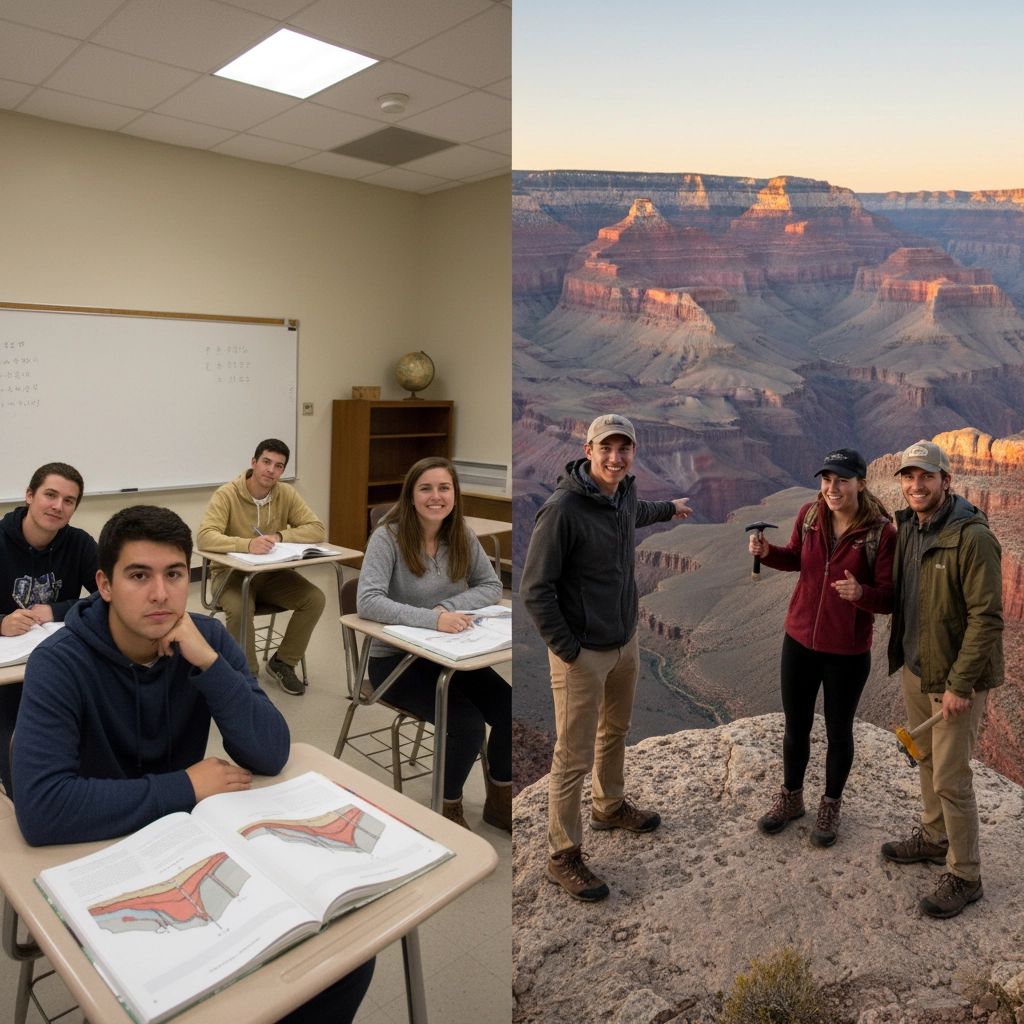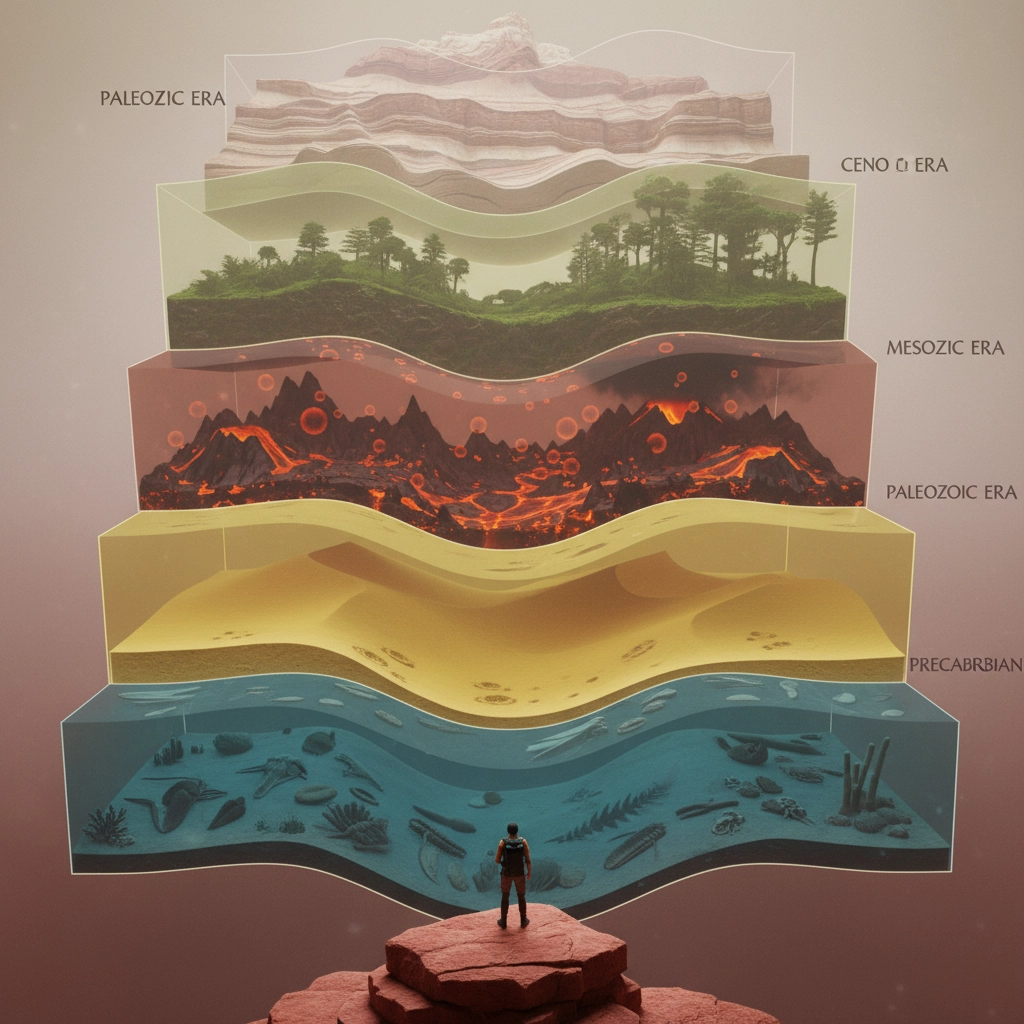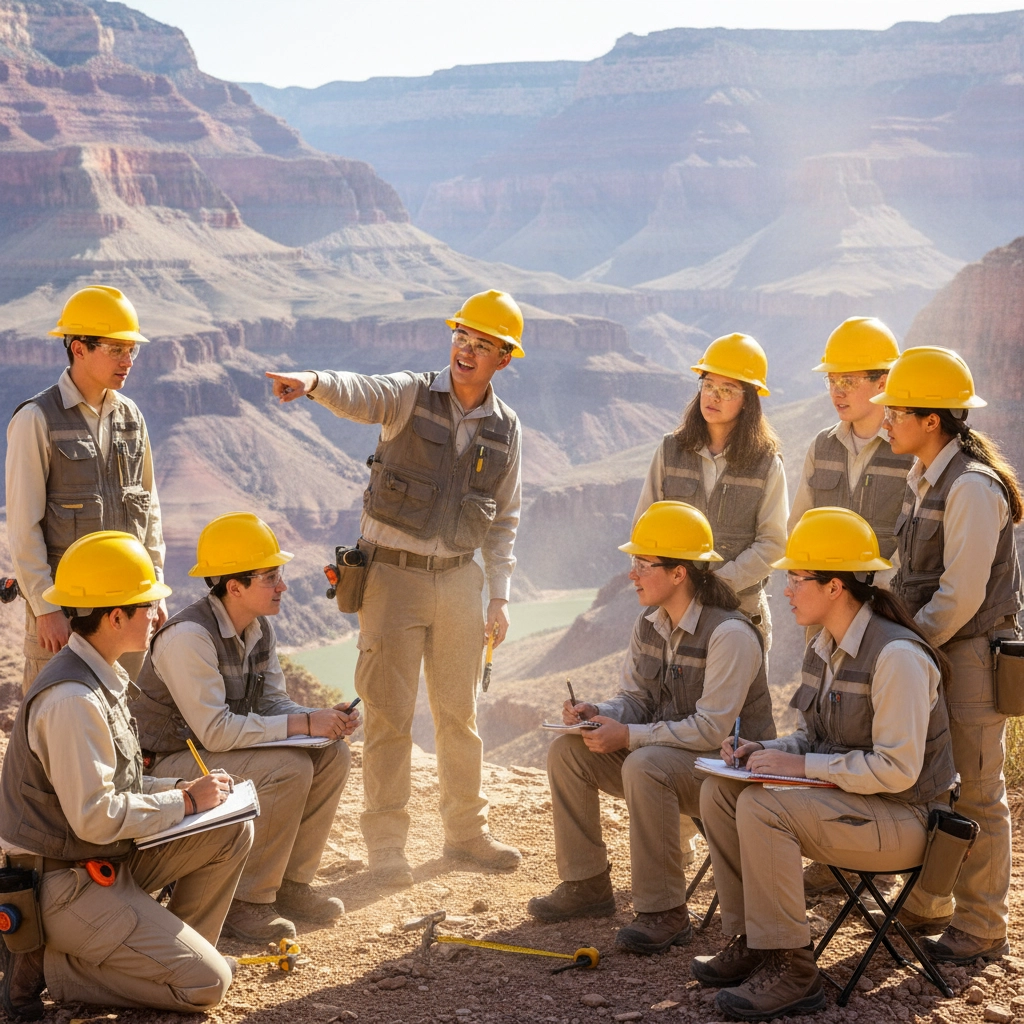Grand Canyon vs. Classroom Learning: Why Your Students Need Real Geology Fieldwork
- Caleb Mullenix
- Nov 6, 2025
- 6 min read
Picture this scenario: Your students have spent weeks studying rock formations, geological time scales, and erosion processes from textbooks. They can define sedimentary layers and explain tectonic movement on paper. But when you ask them to identify actual rock types or interpret landscape features, they struggle to connect classroom concepts with real-world applications.
This disconnect between theoretical knowledge and practical understanding represents one of the most significant challenges in geology education today. While classroom instruction provides essential foundational concepts, research consistently demonstrates that students require direct fieldwork experience to develop the spatial reasoning, problem-solving abilities, and deep understanding that geoscience education demands.
The Critical Limitations of Classroom-Only Geology Education
Traditional classroom geology instruction, while foundational, presents several inherent limitations that restrict student learning outcomes. Textbook learning necessarily abstracts complex geological processes into simplified diagrams and static photographs, creating an incomplete understanding of dynamic Earth systems.
Students studying geology exclusively through classroom materials often develop fragmented knowledge. They may memorize geological principles without understanding how these concepts interconnect across different scales of time and space. For example, students can recite the definition of stratification but struggle to recognize or interpret actual sedimentary sequences when confronted with real rock exposures.
The "theoretical world of the textbook" creates additional challenges by presenting geology as a collection of established facts rather than an active process of scientific inquiry. Students miss the investigative nature of geological science: the skills required to observe, hypothesize, test interpretations, and draw conclusions based on incomplete evidence.

Furthermore, classroom instruction cannot adequately convey the spatial scales involved in geological processes. When students examine photographs of the Grand Canyon in textbooks, they cannot grasp the immense scale of geological time represented in those rock layers or understand the magnitude of erosional forces that carved the landscape over millions of years.
Cognitive and Learning Advantages of Grand Canyon Fieldwork
Real geological fieldwork produces substantial cognitive gains that classroom learning alone cannot achieve. Research involving geoscience educators consistently identifies fieldwork as producing improvements in critical thinking and problem-solving skills, enhanced understanding of fundamental concepts, and proficiency in essential field techniques.
Enhanced Spatial Reasoning and Scale Understanding
Fieldwork develops crucial spatial reasoning abilities that geology professionals require. When students physically traverse geological formations at the Grand Canyon, they develop an intuitive understanding of three-dimensional relationships between rock units, structural features, and landscape evolution that cannot be replicated through classroom instruction.
The ability to comprehend geological time scales represents another critical advantage of fieldwork experience. Students walking across exposed rock surfaces can physically experience the concept of deep time: understanding that each step represents thousands or millions of years of Earth history. This tangible connection to geological time scales creates lasting understanding that textbook descriptions struggle to achieve.
Problem-Solving and Analytical Skills Development
Geological fieldwork inherently requires students to function as scientific detectives, interpreting incomplete evidence and drawing logical conclusions based on observations. Students must marshal scientific arguments and defend interpretations: skills that directly mirror professional geological practice.
Unlike classroom exercises with predetermined answers, field investigations present students with complex, real-world problems requiring creative thinking and analytical reasoning. Students learn to synthesize multiple lines of evidence, consider alternative explanations, and recognize the limitations of their interpretations.
Professional Skill Development Through Hands-On Experience
Fieldwork develops essential professional competencies that extend far beyond subject matter knowledge. Research consistently demonstrates that field-based learning produces improvements in teamwork, communication, collaborative problem-solving, and scientific reasoning that classroom instruction cannot replicate.
Technical and Observational Skills
Students participating in Grand Canyon fieldwork develop proficiency in essential geological techniques including rock identification, structural measurement, stratigraphic analysis, and landscape interpretation. These hands-on skills form the foundation of professional geological practice and cannot be adequately developed through classroom instruction alone.
Field experience also develops critical observational abilities. Students learn to recognize subtle variations in rock properties, identify diagnostic features, and distinguish between similar geological phenomena: skills requiring extensive practice with actual geological materials.

Communication and Collaboration Abilities
Fieldwork naturally develops communication skills as students work in teams to solve complex problems, share observations, and defend interpretations. Students learn to articulate scientific concepts clearly, present evidence effectively, and engage in productive scientific discourse.
The collaborative nature of field investigations teaches students to integrate diverse perspectives, build consensus around interpretations, and recognize the value of peer review in scientific practice.
Enhanced Learning Retention and Student Engagement
Research demonstrates that fieldwork experiences create memorable learning opportunities that support long-term retention and recall. The immersive, multisensory nature of field experiences produces stronger memory formation compared to passive classroom instruction.
Emotional and Motivational Benefits
Direct exposure to spectacular geological sites like the Grand Canyon generates positive emotional responses that enhance motivation and foster genuine scientific interest. For many students, these transformative experiences prove decisive in choosing geoscience career paths.
Fieldwork also develops stronger metacognitive abilities: students' capacity to reflect on their own thinking and recognize knowledge limitations. When confronted with complex geological phenomena, students must actively reconcile textbook knowledge with direct observations, leading to deeper understanding than passive acceptance of information.
Authentic Learning Experiences
Field investigations provide authentic scientific experiences that classroom simulations cannot replicate. Students engage in actual scientific practice rather than artificial exercises, developing realistic expectations about geological careers and research processes.
The unpredictable nature of fieldwork teaches students to adapt to changing conditions, modify research approaches, and work within practical constraints: essential skills for professional success.
Implementing Effective Geological Fieldwork Programs
Successful geological fieldwork requires careful planning and structured implementation to maximize educational benefits. Quality fieldwork should integrate seamlessly with classroom instruction rather than function as isolated experiences.
Pre-Trip Preparation
Effective fieldwork begins with thorough classroom preparation. Students should understand fundamental geological concepts, familiarize themselves with local geological history, and develop basic observational skills before departing for field locations.
Create specific learning objectives for field investigations, ensuring students understand expected outcomes and assessment criteria. Establish clear safety protocols and emergency procedures, emphasizing the importance of responsible behavior in field environments.

During Field Investigations
Structure field activities to promote active learning and scientific inquiry. Provide students with specific research questions, data collection protocols, and analytical frameworks to guide their observations and interpretations.
Encourage collaborative learning by organizing students into small research teams with clearly defined roles and responsibilities. Facilitate group discussions that allow students to share observations, compare interpretations, and build collective understanding.
Post-Trip Analysis and Reflection
Maximize learning outcomes through structured post-trip activities including data analysis, report writing, and presentation development. Students should synthesize field observations with classroom concepts, identifying connections between theoretical knowledge and practical experience.
Encourage students to reflect on their learning experiences, identifying new insights, unexpected discoveries, and areas requiring further investigation.
Technology Integration and Alternative Approaches
While in-person fieldwork remains the gold standard for geological education, emerging technologies offer valuable supplementary tools for enhancing field experiences and addressing logistical constraints.
Augmented reality applications can provide additional context during field investigations, allowing students to visualize geological processes, access historical information, or explore subsurface features. Virtual field trips can supplement actual fieldwork by providing access to distant locations or dangerous field sites.
However, technology works most effectively as a complement to rather than replacement for actual field experience. The tactile, physical aspects of geological investigation cannot be replicated through digital media alone.
The Transformative Impact of Grand Canyon Educational Experiences
The Grand Canyon represents an ideal location for educational geology fieldwork, offering unparalleled opportunities to observe geological processes, study rock formations, and understand landscape evolution. The site's accessibility, safety, and interpretive resources make it particularly suitable for student groups.
Students investigating Grand Canyon geology engage with nearly two billion years of Earth history exposed in accessible rock formations. They can observe evidence of ancient environments, study the effects of erosion and weathering, and understand the relationships between geological processes and landscape development.
The scale and complexity of Grand Canyon geology challenge students to think systematically about geological time, spatial relationships, and process interactions: developing the analytical abilities essential for advanced geological study.
Transform your students' understanding of Earth science through hands-on geological fieldwork at one of America's most spectacular natural laboratories. Appleseed Expeditions' Grand Canyon school trips provide structured educational experiences that combine rigorous scientific investigation with unforgettable learning adventures. Contact our educational travel specialists to design a customized geology program that will inspire your students and enhance their scientific understanding for years to come.



Comments